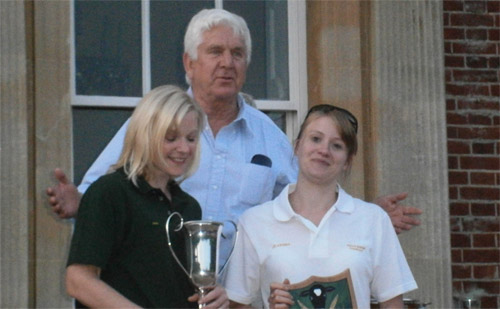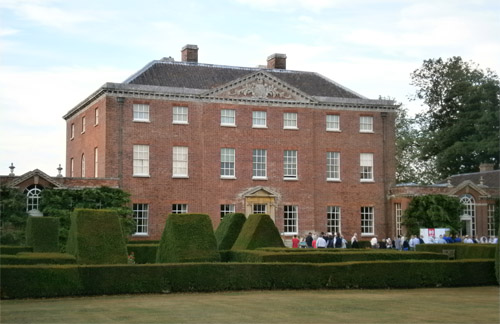Sir John White’s Salle Park Estate won the supreme champion award at the 34th annual Norfolk County farm business competition, organised by the Aylsham Agricultural Show Association (AASA).

Left to right: head gardener Katie Duffield, Sir John White and housekeeper Clarissa Greves accepting the Barclays Bank trophy on behalf of Salle Park Estate
Salle Park has won the title at least five times and was reserve supreme last year. Estate manager Poul Hovesen, who is also director of farming on the Earl of Leicester’s Holkham Estate, won the award of champion farm manager. The reserve award went to Nigel Joice of Uphouse Farm, South Raynham, near Fakenham, which received last year’s top award.
Lincolnshire judges Duncan Worth and Nigel Patrick visited the five contenders for supreme honours. The other finalists were Heygate Farms, Snailspit Farm, Swaffham; J H Withers & Son, Honey Top Farm, Edingthorpe, North Walsham; and Chapman Farms, Hill Farm, Rollesby, Great Yarmouth. The sponsors of the 34th annual competition were Brown & Co and Anglia Farmers.
Members of the AASA and other guests were invited to the annual farm walk and presentation of trophies, which took place at Manor Farm, Salle, on Monday 15 July.
The White family has owned Salle Park Estate since 1890. Sir John took over in 1971 and since then has focused on developing a professionally run, traditional family estate. With conservation as one of his personal commitments, he has overseen the establishment of areas of amenity woodland and the reinstatement of several miles of native hedgerows.
Mr Hoveson managed farms in Denmark before moving to the UK in 1987 to take over the role of farms and estate manager for Salle Farms, which has since increased in size from 1,000 hectares to 1,700 hectares following the purchase of the Guestwick Estate in 1991.
Today, the arable operations cover more than 2,000 hectares, including three local farms managed under contract arrangements. A further 900 hectares of arable land is owned and farmed in Poland.
Cropping at Salle comprises a combination of winter and spring-sown cereals, sugar beet, spring beans and oilseed rape grown on a seven-year rotation. Permanent pasture is let for grazing by sheep and cattle, while a Christmas tree plantation occupies 37 hectares, supplying trees for the Estate’s own shop and local garden centres.
The Estate also undertakes contracting operations, including three whole-farm contracts, sugar beet crop seed to harvest operations, fertiliser spreading and crop spraying.
The grain stores are registered with the Trade Association Scheme for Combinable Crops (TASCC) for handling and storage of grain and oilseed rape for third-party grain trading companies. TASCC has also been instrumental in developing contracts with end-users, including one of East Anglia’s leading brewers.
Salle Park Estate operates a shoot over 19 days a year, of which eight days are let, which includes the full facilities of the Georgian splendour of Salle Hall. In addition to rearing 7,500 birds for the shoots, a further 3,500 are reared for sale to neighbouring estates.
Meanwhile, the Salle Park Gardens have been lovingly restored into a fully productive Victorian walled garden and Georgian pleasure gardens, which now provide vegetables and flowers for the Hall.
Salle currently has 183 hectares of arable and permanent pasture in the Environmental Stewardship scheme, including arable land in Entry and Higher Level Stewardship (ELS/HLS). This agri-environmental scheme provides funding to farmers and other land managers to deliver effective environmental management.
In recent years, Salle Farms has been actively involved in a Catchment Sensitive Farming programme and is currently participating in a UK-wide project to improve water quality. The Demonstration Test Catchment (DTC) projects funded jointly by the Department for Environment, Food and Rural Affairs and the Environment Agency (Defra) are investigating the effectiveness of on-farm measures to reduce diffuse pollution.
Members of the Defra Wensum DTC were on hand to explain the project as part of the farm visit, during which around 175 guests, including farmers, agronomists, land agents, agricultural suppliers and engineers, representing a broad cross-section of the Norfolk farming community, were ferried across the entire estate in trailers.

Salle Park Estate operates a shoot over 19 days a year, of which eight days are let, which includes the full facilities of the Georgian splendour of Salle Hall
